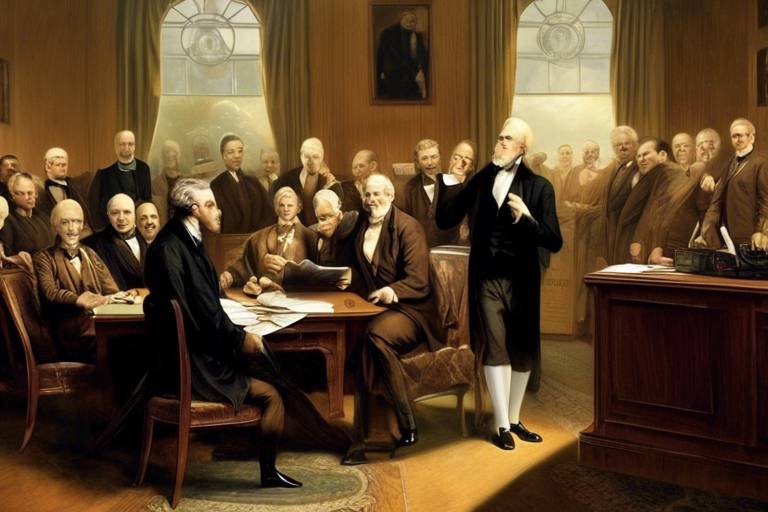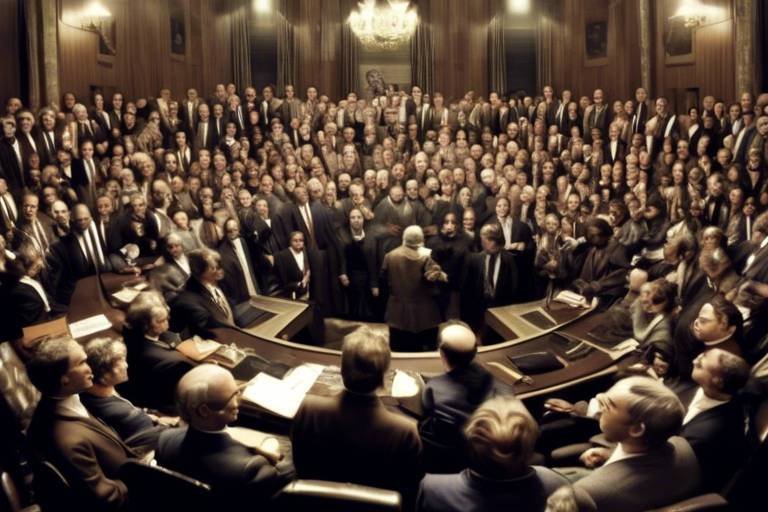The Philosophy of Law and Order in Politics
This article explores the intricate relationship between law, order, and political philosophy, examining how these concepts shape governance, societal norms, and individual rights within various political frameworks.
Understanding the foundational principles of law is essential in political philosophy. Law is not just a set of rules; it's the backbone of any society, providing a framework for justice and order. Think of law as the glue that holds the fabric of society together. Without it, chaos would reign supreme. The purpose of law is multifaceted—it regulates behavior, protects individual rights, and promotes the common good. Moreover, law influences human behavior by establishing norms and expectations. When people know the rules, they are more likely to act in ways that are beneficial to society.
Order is a crucial aspect of political stability. Imagine a world where everyone acted solely on impulse—traffic lights would be ignored, contracts would be meaningless, and trust would be a rare commodity. Order is essential for governance; it ensures that laws are followed and that citizens feel safe. A well-ordered society allows for the smooth functioning of political systems, enabling citizens to engage in civic duties and participate in democratic processes. Without order, governance becomes a Herculean task, fraught with conflict and unrest.
Natural law theory posits that certain rights and moral values are inherent in human nature. This perspective suggests that law should reflect these universal principles. It implies that there are higher moral standards that transcend human-made laws. For instance, concepts like justice and equality are often viewed as natural rights that should be upheld by any legal system. The implications for law and order in political philosophy are profound, as they challenge us to consider whether laws are just simply because they exist or if they must align with a moral compass.
Exploring the historical development of natural law reveals a rich tapestry of thought. Key philosophers like Aristotle, Thomas Aquinas, and John Locke contributed significantly to our understanding of law and order. Aristotle argued that law should aim for the common good, while Aquinas emphasized the importance of divine law. Locke’s theories on natural rights laid the groundwork for modern democracy. Each philosopher’s contributions illustrate how the understanding of law has evolved over centuries, shaping political thought and practice.
Modern interpretations of natural law reflect contemporary issues in law and politics. In today’s world, the application of natural law can be seen in debates surrounding human rights, social justice, and environmental ethics. For example, discussions about climate change often invoke natural law principles, arguing that we have a moral obligation to protect the planet for future generations. This evolving perspective highlights the relevance of natural law in addressing current societal challenges.
Positive law, as established by human enactment, contrasts sharply with natural law. It is the law that is written and enforced by governmental bodies. While natural law is about inherent rights, positive law is about the rules that societies create to maintain order. This distinction is crucial; positive law shapes legal systems and defines what is permissible within a given society. However, the challenge lies in ensuring that positive laws do not violate the fundamental principles of justice and morality.
Justice is a fundamental principle intertwined with law and order. The effectiveness of law enforcement practices is pivotal in upholding justice within society. Yet, this relationship is not without controversy. Philosophical debates abound regarding the methods used by law enforcement agencies. Are they always just? Do they disproportionately target certain communities? These questions highlight the complexities of maintaining order while ensuring that justice prevails.
The ethical considerations of law enforcement practices are crucial in political philosophy. Law enforcement agencies often face moral dilemmas, especially when enforcing laws that may be perceived as unjust. For instance, consider the debate surrounding the use of force. While law enforcement is tasked with maintaining order, the ethical implications of their methods can lead to public distrust and unrest. Thus, it is essential to examine the ethical frameworks that guide law enforcement practices.
Community policing emphasizes collaboration between law enforcement and communities. This approach fosters trust and enhances order by encouraging proactive engagement with citizens. When law enforcement works alongside community members, it creates a sense of shared responsibility for public safety. This partnership can lead to a more just society, where the voices of all citizens are heard and valued.
Authority is essential for enforcing law and maintaining order. Different forms of authority exist within political systems, from democratic to authoritarian regimes. Each form impacts governance and societal compliance in unique ways. Understanding these dynamics is key to grasping how authority shapes the legal landscape. For instance, in a democracy, authority is derived from the consent of the governed, while in an authoritarian regime, it may stem from coercion.
The legitimacy of authority is a key concern in political philosophy. It’s not enough for authority to simply exist; it must also be accepted by the people. This acceptance is crucial for law and order in society. When authority is perceived as legitimate, citizens are more likely to comply with laws and regulations. Conversely, when authority is questioned, it can lead to unrest and challenges to the established order.
Understanding challenges to authority provides insight into political dynamics. Factors such as social movements, public dissent, and political corruption can undermine the legitimacy of authority. These challenges often spark debates about the balance between order and freedom. When citizens feel their rights are being infringed upon, they may rise up against authority, leading to significant shifts in the political landscape.
The relationship between law, order, and individual rights is complex and often contentious. Laws are designed to protect individual rights while maintaining societal order, but conflicts can arise. For instance, consider a situation where a law aimed at maintaining public safety infringes on personal freedoms. This tension highlights the ongoing struggle to find a balance between collective security and individual liberties.
Balancing individual rights with the need for order is a critical challenge in political philosophy. Philosophical perspectives on this equilibrium vary widely. Some argue that individual rights must always take precedence, while others contend that order is essential for a functioning society. This debate invites us to reflect on our values and consider what we are willing to sacrifice for the sake of order or freedom.
Social movements often challenge existing laws and order, pushing for reforms that reflect contemporary values. These movements can significantly influence legal frameworks and the understanding of rights within political contexts. For instance, movements advocating for racial equality and LGBTQ+ rights have reshaped laws and societal norms, highlighting the dynamic interplay between law, order, and individual rights.
- What is the difference between natural law and positive law? Natural law refers to inherent rights and moral values, while positive law is created and enforced by human institutions.
- How does order contribute to political stability? Order ensures that laws are followed, promoting safety and trust within a society, which is essential for effective governance.
- What role do social movements play in shaping laws? Social movements challenge existing laws and advocate for reforms, influencing the legal landscape and societal norms.

The Concept of Law
Understanding the foundational principles of law is essential in political philosophy. At its core, the concept of law serves as a framework that governs the conduct of individuals and institutions within a society. Imagine law as the invisible thread that weaves the fabric of society together, providing structure and stability. Without it, chaos could reign, leading to a breakdown of order and an infringement on individual rights.
Law is not merely a set of rules; it embodies the values and norms of a society. It reflects the collective beliefs about what is right and wrong, shaping the behavior of its citizens. For instance, laws against theft and violence protect property and personal safety, reinforcing the idea that these actions are unacceptable. In this way, law acts as a mirror, reflecting the ethical standards of the community while simultaneously guiding behavior.
Furthermore, the purpose of law extends beyond mere regulation. It aims to achieve justice, promote social welfare, and ensure the protection of individual rights. Laws can be categorized into various types, including criminal law, civil law, and administrative law, each serving distinct functions:
- Criminal Law: Addresses offenses against the state or public, imposing penalties to deter harmful behavior.
- Civil Law: Governs disputes between individuals or organizations, providing a framework for resolving conflicts.
- Administrative Law: Regulates the activities of governmental agencies, ensuring they operate within the law.
Through these categories, law provides a mechanism for conflict resolution, ensuring that disputes can be settled fairly and justly. It also plays a critical role in maintaining social order by establishing consequences for those who violate established norms. This enforcement of laws is what allows societies to function smoothly, much like the gears of a well-oiled machine.
However, the concept of law is not without its complexities. Different political philosophies interpret the nature and purpose of law in varied ways. For example, a **natural law** perspective posits that laws are derived from moral principles inherent in human nature, suggesting that unjust laws lack legitimacy. In contrast, **positive law** advocates argue that laws are valid simply because they are enacted by a legitimate authority, regardless of their moral implications.
This divergence in interpretation raises important questions about the relationship between law and morality. Should laws reflect moral values, or should they be purely functional? This debate continues to shape discussions in political philosophy, highlighting the dynamic nature of law as it evolves in response to societal changes and challenges.
In conclusion, the concept of law is a multifaceted construct that serves as the backbone of any political system. It not only regulates behavior but also embodies the ethical standards of a society, aiming to achieve justice and maintain order. As we delve deeper into the philosophy of law and order, we will uncover the various dimensions that influence governance and individual rights.
- What is the purpose of law in society? Law serves to regulate behavior, promote justice, and protect individual rights within a community.
- How does law reflect societal values? Laws are created based on the collective beliefs about right and wrong, thus mirroring the ethical standards of the society they govern.
- What are the different types of law? The main categories include criminal law, civil law, and administrative law, each serving unique functions within the legal system.
- What is the difference between natural law and positive law? Natural law is based on inherent moral principles, while positive law is established by human enactment, regardless of moral considerations.
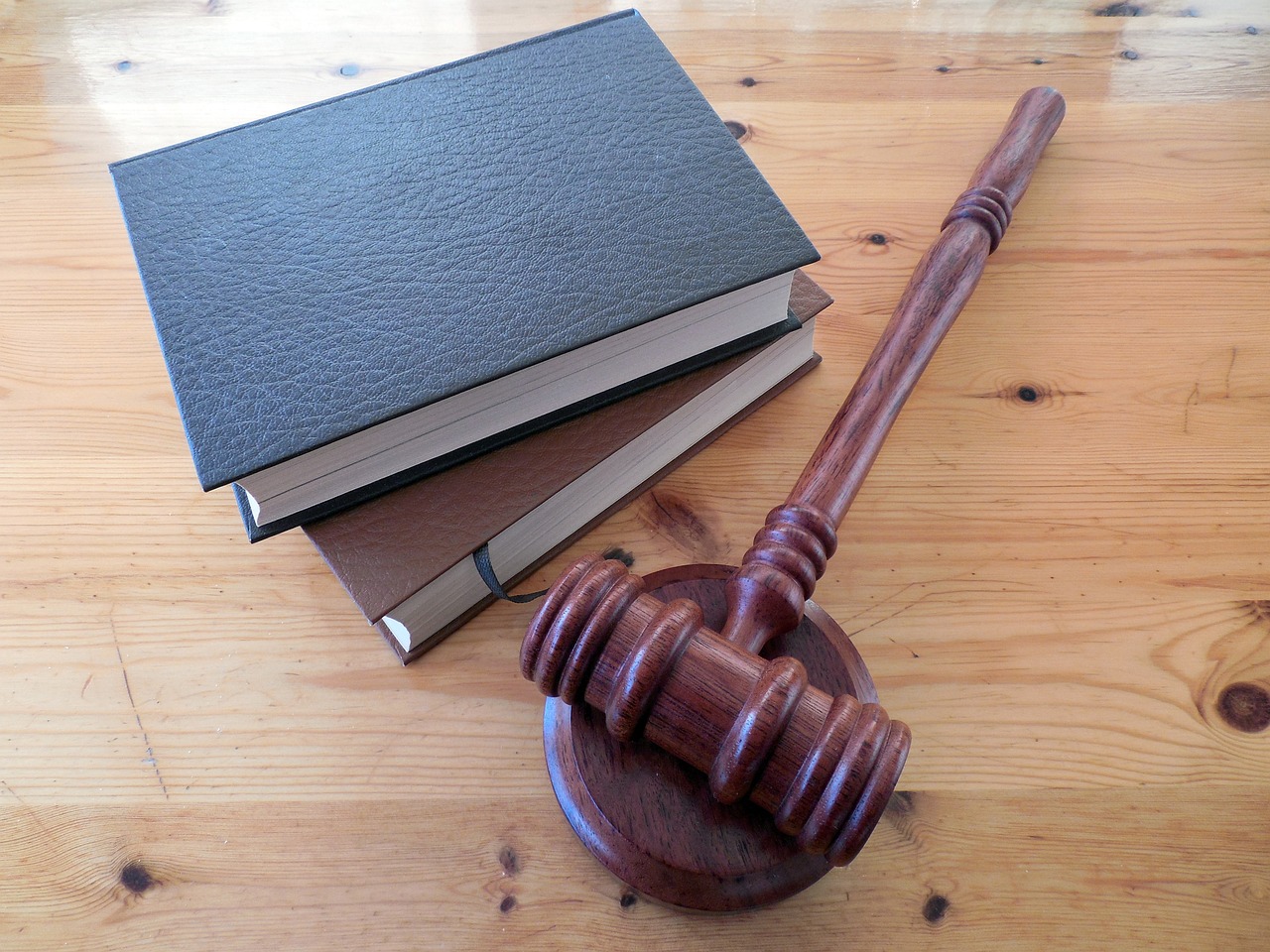
Order is not just a buzzword in the realm of politics; it is the very backbone of a functioning society. Imagine a world where chaos reigns supreme—where laws exist but are not followed, and where societal norms are mere suggestions rather than rules. The importance of order in governance cannot be overstated, as it provides a framework within which individuals can coexist peacefully. Without order, the very fabric of society begins to unravel, leading to conflict, confusion, and an overall breakdown of trust.
At its core, order is about establishing guidelines and structures that allow for predictable interactions among individuals. This predictability is crucial for fostering a sense of security and stability, both of which are essential for any thriving community. When people feel secure, they are more likely to engage in positive social behaviors, contribute to their communities, and uphold the law. Conversely, in the absence of order, fear and uncertainty dominate, making it nearly impossible for individuals to flourish.
Furthermore, order plays a pivotal role in the enforcement of laws and the protection of individual rights. It ensures that there is a clear understanding of what is acceptable behavior and what is not. This clarity is vital for maintaining peace and preventing conflicts. For instance, consider the following aspects of order:
- Predictability: Order allows individuals to anticipate the consequences of their actions, which encourages compliance with laws.
- Stability: A well-ordered society is more resilient to disruptions and can recover more quickly from crises.
- Trust: When order is upheld, individuals are more likely to trust one another and their governing institutions.
Moreover, the concept of order extends beyond mere legal frameworks; it encompasses cultural norms, social expectations, and ethical standards that guide behavior. These elements work together to create a cohesive society where individuals recognize their responsibilities to one another. As political philosopher Thomas Hobbes famously stated, “Without the common power to keep them all in awe, they are in that condition which is called war; and such a war, as is of every man against every man.” This highlights the necessity of order for preventing societal breakdown.
In political systems, order is often reinforced through various means, including law enforcement, judicial systems, and community engagement initiatives. These mechanisms not only uphold the law but also foster a sense of belonging and responsibility among citizens. When communities actively participate in maintaining order, they cultivate a shared commitment to the common good, which is essential for a healthy democracy.
However, it’s important to recognize that the quest for order is not without its challenges. Striking the right balance between enforcing laws and respecting individual freedoms can be a delicate dance. Too much emphasis on order can lead to authoritarianism, where the rights of individuals are suppressed in the name of maintaining control. On the other hand, too little order can result in chaos, where laws are disregarded, and individual rights are trampled upon. Therefore, the challenge for any political system is to find a harmonious equilibrium that promotes both order and liberty.
In summary, order is a fundamental component of any political framework. It shapes governance, influences societal norms, and impacts individual rights. Recognizing its importance is crucial for developing effective policies and fostering a just society. As we navigate the complexities of modern governance, understanding the intricate relationship between law, order, and individual rights will be key to ensuring a stable and thriving community.
- Why is order important in society?
Order is essential for maintaining peace, predictability, and trust among individuals, allowing for a stable and functioning society. - How does order relate to individual rights?
While order is necessary for societal stability, it must be balanced with the protection of individual rights to prevent authoritarianism. - What are some challenges to maintaining order?
Challenges include finding the right balance between enforcement and freedom, as well as addressing social inequalities that may disrupt order.

Natural law theory is a fascinating concept that suggests that certain rights and moral values are inherent in human nature. Imagine a universal code that transcends man-made laws, guiding our understanding of justice and morality. This theory posits that there are fundamental principles of right and wrong that exist independently of government or societal constructs. It’s as if nature itself has laid down the law, and our task is to discover and adhere to these intrinsic truths.
The implications of natural law for law and order in political philosophy are profound. At its core, natural law argues that human beings possess innate rights, such as the right to life, liberty, and the pursuit of happiness. These rights are not granted by any authority; rather, they are inherent to our existence. This perspective challenges the notion that laws are solely the product of human design. Instead, it emphasizes that laws should reflect these universal principles. When laws align with natural law, they promote justice and order; when they diverge, chaos and injustice can ensue.
Throughout history, various philosophers have championed natural law theory, each adding their unique insights and interpretations. For instance, Aristotle viewed natural law as a reflection of a rational order in the universe, while Thomas Aquinas integrated it with Christian theology, arguing that divine law complements natural law. In contrast, more contemporary thinkers, like John Finnis, have explored how natural law can be applied to modern legal systems, advocating for a balance between moral values and legal frameworks.
Yet, the application of natural law is not without its challenges. In a world where diverse cultures and beliefs coexist, defining what constitutes 'natural' can lead to significant disagreements. For instance, some argue that the rights recognized by natural law should evolve with societal changes, while others maintain that these rights are fixed and universal. This debate raises essential questions: How do we determine which rights are inherent? And who gets to decide what natural law entails?
In conclusion, natural law theory serves as a critical lens through which we can examine the foundations of law and order in political philosophy. It invites us to reflect on the nature of justice and the ethical responsibilities of governance. As we navigate the complexities of modern society, understanding the principles of natural law can guide us in creating legal systems that not only maintain order but also uphold the dignity and rights of every individual.
- What is natural law? Natural law refers to a set of inherent rights and moral principles believed to be universal and applicable to all human beings, independent of societal laws.
- How does natural law influence political philosophy? Natural law provides a foundation for understanding justice and morality within political systems, advocating for laws that reflect universal human rights.
- Are natural rights the same for everyone? While natural rights are considered universal, interpretations of what those rights entail can vary across cultures and societies.
- Who are some key philosophers associated with natural law? Key figures include Aristotle, Thomas Aquinas, and modern theorists like John Finnis, each contributing unique perspectives to the theory.

The concept of natural law has a rich and intriguing history that dates back to ancient civilizations. It serves as a philosophical foundation for understanding the interplay between law and morality. To truly grasp the significance of natural law, one must explore the contributions of key philosophers throughout history, each adding layers of complexity to this essential doctrine.
In ancient Greece, philosophers like Socrates and Plato laid the groundwork for natural law by discussing the existence of an objective moral order. Socrates famously asserted that knowledge is virtue, implying that understanding the good leads to just actions. Plato, in his dialogues, introduced the idea of the Forms, suggesting that the ideal forms of justice and goodness exist beyond our physical world, influencing human behavior and laws.
Moving forward to the Roman era, the philosopher Cicero expanded on these ideas, proposing that true law must align with reason and the natural order. He argued that laws should reflect the universal principles of justice that govern human conduct, a notion that resonated deeply in the development of Western legal thought. Cicero’s work laid the groundwork for later thinkers who would further explore the relationship between law and morality.
During the Middle Ages, the integration of Christian theology with natural law was championed by thinkers like Thomas Aquinas. He posited that natural law is part of God's divine plan and that humans can discern moral truths through reason. Aquinas categorized law into four types: eternal law, natural law, human law, and divine law, emphasizing that human laws must align with natural law to be just. This synthesis of faith and reason profoundly influenced the legal systems of Europe.
As we transitioned into the Enlightenment, philosophers such as John Locke and Jean-Jacques Rousseau redefined natural law in the context of individual rights and social contracts. Locke argued that individuals possess inherent rights to life, liberty, and property, which governments must protect. Rousseau, on the other hand, emphasized the collective will of the people, suggesting that legitimate political authority arises from the general will, further complicating the relationship between law and morality.
In the modern era, natural law theory faced challenges from positivist thinkers like Jeremy Bentham and John Austin, who argued that law is a construct of human society and should not be conflated with morality. Despite this, the principles of natural law continued to influence human rights movements and international law, asserting that certain rights are universal and inalienable.
Today, the legacy of natural law is evident in contemporary legal debates surrounding human rights, justice, and the moral foundations of law. The historical context of natural law highlights an ongoing dialogue about the nature of justice and the role of moral principles in shaping legal frameworks. As society evolves, the relevance of natural law remains a topic of profound importance, prompting us to question how laws can reflect our shared moral values while ensuring justice and order.
- What is natural law? Natural law is a philosophical theory that posits certain rights and moral values are inherent in human nature and can be understood through reason.
- How has natural law influenced modern legal systems? Natural law has shaped human rights discussions and continues to influence legal frameworks by asserting that certain rights are universal and inalienable.
- Who are some key philosophers associated with natural law? Key philosophers include Socrates, Plato, Cicero, Thomas Aquinas, John Locke, and Jean-Jacques Rousseau, each contributing to the understanding of law and morality.
- What is the difference between natural law and positive law? Natural law is based on inherent moral principles, while positive law is created by human enactment and may not necessarily align with moral values.

In today's rapidly evolving society, the notion of natural law has undergone significant reinterpretation, reflecting contemporary challenges and advancements in our understanding of justice and human rights. Modern interpretations of natural law suggest that while certain rights may be inherent, their application must also consider the complexities of modern governance and the diverse cultural contexts in which these laws operate. This has led to a dynamic discourse on how natural law interacts with legislative frameworks and social norms.
For instance, consider how the principles of natural law have been invoked in discussions about human rights. Advocates argue that certain rights, such as the right to life, liberty, and the pursuit of happiness, are not merely privileges granted by governments but are fundamental to our existence as human beings. This perspective challenges lawmakers to ensure that legislation aligns with these universal principles, fostering a legal environment that respects and upholds individual dignity.
Moreover, the integration of natural law in contemporary legal systems raises questions about its compatibility with positive law, which is created through human enactment. This juxtaposition often leads to debates about the legitimacy and morality of laws that may contradict natural rights. For example, laws that discriminate against marginalized groups can be scrutinized through the lens of natural law, prompting calls for reform and greater equity.
To further illustrate this point, let's look at some modern issues where natural law plays a crucial role:
- Environmental Rights: The growing recognition of environmental rights as a natural extension of human rights highlights the need for laws that protect our planet for future generations.
- Digital Privacy: In an age where personal data is constantly at risk, discussions about the right to privacy are increasingly framed within the context of natural law.
- Social Justice Movements: Movements advocating for racial and gender equality often rely on natural law principles to argue for systemic change.
These examples underscore the importance of adapting natural law to address the realities of modern life, ensuring that it remains relevant and impactful. As societies grapple with issues such as climate change, technological advancements, and social inequality, the application of natural law must evolve to meet these challenges head-on.
In conclusion, modern interpretations of natural law are not just academic exercises; they are vital to shaping a just society. By grounding legal frameworks in the principles of natural law, we can strive for a world where laws not only govern but also reflect our shared humanity. As we continue to navigate the complexities of law and order, the dialogue around natural law will undoubtedly play a pivotal role in defining our collective future.
- What is natural law? Natural law is a philosophical theory suggesting that certain rights and moral values are inherent in human nature and can be understood through reason.
- How does natural law differ from positive law? Natural law is based on universal moral principles, while positive law is created by human authorities and may vary between societies.
- Why are modern interpretations of natural law important? They help address contemporary issues and ensure that laws reflect fundamental human rights and dignity in a changing world.

Positive law, often referred to as enacted law, is a cornerstone of legal systems around the globe. Unlike natural law, which is based on inherent moral principles, positive law is constructed through formal legislation and regulations established by governing bodies. This distinction is crucial because it highlights how laws are not merely reflections of moral truths but are instead shaped by societal agreements and political processes. In essence, positive law is like a set of rules in a game; they dictate how players should behave, but they can change based on the consensus of those involved.
One of the primary functions of positive law is to provide a framework for maintaining order within society. By outlining specific behaviors that are permissible or impermissible, positive law serves to minimize chaos and promote stability. For example, traffic laws regulate how vehicles should move on the road, ensuring safety and efficiency. Without such laws, the roads would be a chaotic environment where accidents and conflicts are inevitable. Thus, positive law acts as the backbone of societal order, establishing clear expectations for behavior.
Moreover, positive law is not static; it evolves with society's needs and values. Changes in social norms, technological advancements, and shifts in political landscapes can all prompt revisions to existing laws or the creation of new ones. For instance, the rise of digital technology has led to the establishment of laws regarding cybersecurity and data protection, reflecting the growing importance of these issues in our daily lives. This adaptability is essential for ensuring that the legal system remains relevant and effective in addressing contemporary challenges.
However, the reliance on positive law also raises important questions about justice and morality. Since positive laws are created by humans, they can sometimes reflect biases or injustices present in society. For example, laws that have historically marginalized certain groups demonstrate how positive law can perpetuate inequality. This reality necessitates a critical examination of the laws we live by, prompting discussions about their fairness and the need for reform. In this light, positive law can be seen as a double-edged sword: it is essential for order but must be scrutinized to ensure it serves justice.
In summary, positive law is a dynamic and essential component of governance that shapes the way individuals and societies interact. It provides a necessary structure for maintaining order, yet it also requires ongoing evaluation to align with ethical standards and societal values. As we navigate the complexities of modern life, understanding the implications of positive law becomes increasingly vital in our quest for a just and orderly society.
- What is the difference between positive law and natural law?
Positive law is created by human beings through legislation, while natural law is based on inherent moral principles believed to be universal. - How does positive law evolve?
Positive law evolves through legislative processes, societal changes, and shifts in public opinion, reflecting the changing values and needs of society. - Can positive law be unjust?
Yes, positive law can reflect societal biases and injustices, which is why it is essential to continually assess and reform laws to ensure they promote fairness and equality.
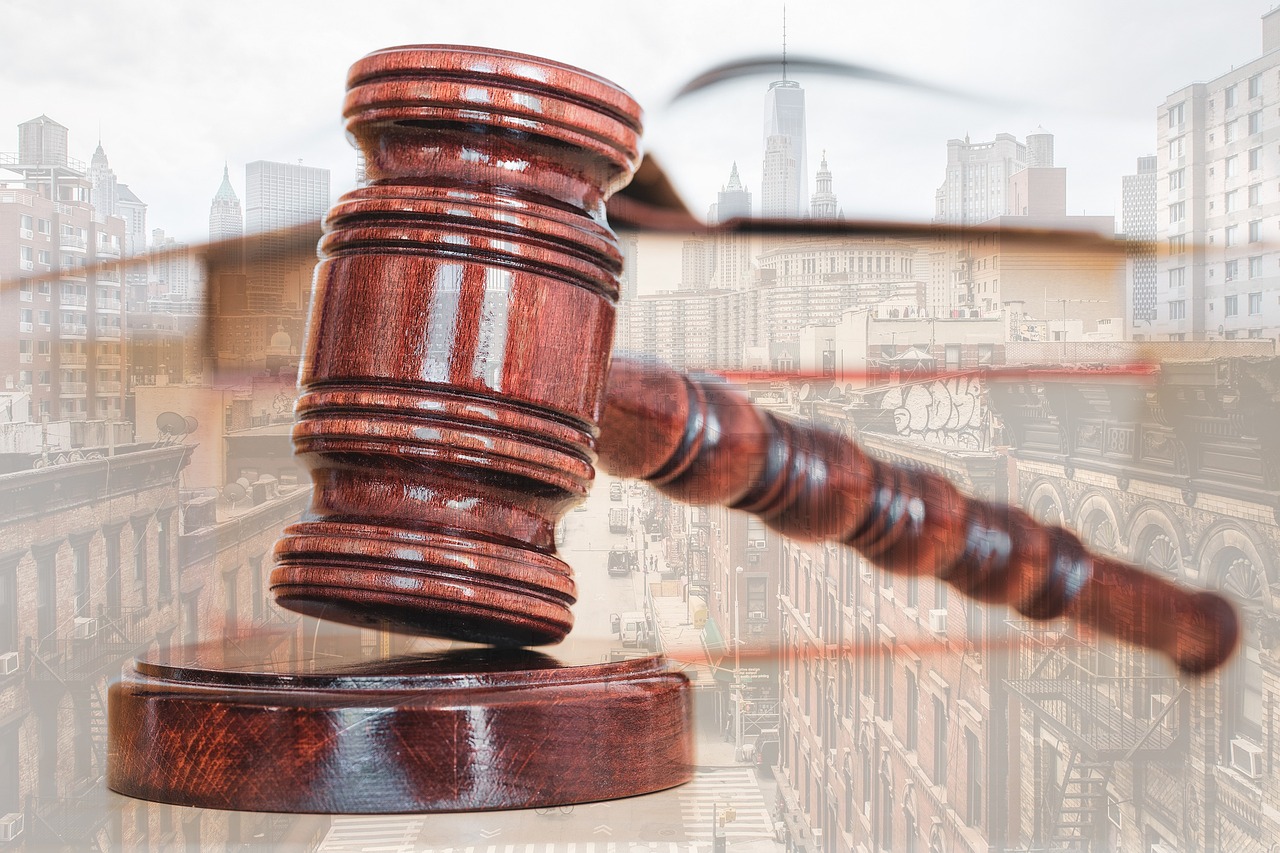
Justice is not just a lofty ideal; it’s the backbone of any functioning society. When we talk about law enforcement, we’re diving into a realm where the abstract principles of justice meet the gritty realities of daily life. Imagine a world without law enforcement—chaos would reign, and justice would be a mere illusion. This section explores how law enforcement practices uphold justice, the ethical dilemmas that arise, and the philosophical debates surrounding their effectiveness in maintaining social order.
At its core, law enforcement is about ensuring that laws are followed and that justice is served. However, this task is easier said than done. Law enforcement agencies are often caught in a web of complexities that challenge their ability to maintain order while upholding the principles of justice. For instance, consider the balance between enforcing laws and respecting individual rights. Law enforcement officers must navigate this tightrope daily, making decisions that can have profound implications for both the community and the individuals involved.
One of the most pressing issues in law enforcement today is the ethical considerations that come into play. The moral dilemmas faced by law enforcement agencies can be daunting. For example, should an officer prioritize the enforcement of a law that may disproportionately affect a marginalized community? This question doesn’t have a straightforward answer, as it delves into the heart of what justice truly means. The challenge lies in ensuring that law enforcement practices are not only effective but also fair and just.
Moreover, the effectiveness of law enforcement in upholding justice is often scrutinized. Are the methods employed by law enforcement agencies truly serving the interests of justice, or do they sometimes perpetuate injustice? This is where community policing comes into play. Community policing emphasizes collaboration between law enforcement and the communities they serve, fostering trust and enhancing the overall sense of order. By working together, communities and law enforcement can create a more just society, where the focus shifts from mere enforcement to building relationships and understanding the needs of the community.
To better understand the role of law enforcement in achieving justice, let’s take a look at some key aspects:
| Aspect | Description |
|---|---|
| Accountability | Law enforcement agencies must be held accountable for their actions to maintain public trust. |
| Transparency | Open communication with the community helps to demystify law enforcement practices. |
| Community Engagement | Building partnerships with community members enhances cooperation and reduces crime. |
In conclusion, the relationship between justice and law enforcement is intricate and multifaceted. While law enforcement is essential for maintaining order and enforcing laws, it must also be conducted in a manner that respects individual rights and promotes justice. As societies evolve, so too must the practices of law enforcement, ensuring that they adapt to meet the needs of the community while upholding the principles of justice.
- What is the primary role of law enforcement in society?
The primary role of law enforcement is to uphold the law, maintain public order, and ensure justice is served. - How does community policing contribute to justice?
Community policing fosters collaboration between law enforcement and the community, enhancing trust and promoting a more just society. - What ethical dilemmas do law enforcement officers face?
Officers often face dilemmas regarding the enforcement of laws that may disproportionately affect certain communities, raising questions about fairness and justice.

The ethics of law enforcement is a topic that stirs deep emotions and complex discussions. At its core, law enforcement is tasked with maintaining public order and ensuring justice, but the methods and practices employed can sometimes clash with ethical standards. The delicate balance between enforcing the law and upholding individual rights creates a rich tapestry of moral dilemmas that law enforcement officers face daily. How do they navigate this intricate landscape? What principles guide their actions in the heat of the moment?
One of the fundamental principles in law enforcement ethics is the concept of accountability. Officers are expected to act in a manner that is not only lawful but also morally sound. This means that their decisions should be transparent and subject to scrutiny. When an officer uses force, for instance, the justification for that force must be clear and justifiable. This can lead to a significant amount of stress and pressure on law enforcement professionals, as they must constantly assess their actions against ethical standards while simultaneously protecting themselves and the public.
Moreover, the ethical landscape of law enforcement is further complicated by various factors, including community expectations, legal standards, and personal morals. Officers often find themselves in situations where they must make quick decisions, weighing the potential consequences of their actions. For example, the use of force is a contentious issue, and officers must consider not only the immediate threat but also the long-term implications of their actions on community relations. In this context, the necessity for ongoing training in ethics and de-escalation techniques becomes apparent.
Furthermore, the concept of discretion plays a vital role in law enforcement ethics. Officers are granted a degree of discretion in how they enforce laws, which can lead to ethical quandaries. For instance, an officer might choose to issue a warning instead of a ticket for a minor infraction. While this discretion can foster goodwill within the community, it also opens the door to potential biases and inconsistencies in law enforcement practices. Therefore, establishing clear guidelines and training on the ethical use of discretion is essential.
To encapsulate the ethical framework within law enforcement, we can consider the following key principles:
- Integrity: Officers must act honestly and uphold the law without favoritism.
- Respect for Human Rights: Every individual deserves to be treated with dignity, regardless of circumstances.
- Fairness: Law enforcement actions should be impartial and equitable.
- Transparency: Officers should be open about their actions and decisions, allowing for public accountability.
In conclusion, the ethics of law enforcement is a multifaceted issue that requires ongoing reflection, discussion, and education. As society evolves, so too must the ethical standards that guide law enforcement practices. It is imperative for officers to not only enforce the law but to do so in a manner that is consistent with the values of justice, fairness, and respect for all individuals. This commitment to ethical conduct not only enhances the legitimacy of law enforcement but also fosters trust and cooperation within the communities they serve.
- What is the primary ethical obligation of law enforcement officers?
Law enforcement officers are primarily obligated to uphold the law while respecting the rights and dignity of all individuals. - How do ethical dilemmas affect law enforcement practices?
Ethical dilemmas can lead to challenges in decision-making, impacting the effectiveness and public perception of law enforcement. - Why is accountability important in law enforcement?
Accountability ensures that officers are held responsible for their actions, promoting trust and transparency within the community.

Community policing is a dynamic approach to law enforcement that emphasizes the importance of collaboration between police forces and the communities they serve. This strategy is not merely about enforcing laws; it’s about building lasting relationships and fostering trust. Imagine a neighborhood where the police are seen not just as enforcers of law but as integral members of the community. This shift in perspective can significantly enhance public safety and improve the quality of life for residents.
At its core, community policing operates on the principle that effective law enforcement requires active participation from community members. By involving citizens in the policing process, law enforcement agencies can better understand local issues, concerns, and dynamics. This collaborative effort leads to tailored solutions that address specific community needs rather than a one-size-fits-all approach. For instance, a neighborhood plagued by petty crime might benefit from community watch programs, while areas facing drug-related issues could see success through outreach and rehabilitation initiatives.
One of the most compelling aspects of community policing is its focus on prevention rather than just reaction. Traditional policing often reacts to crime after it occurs, but community policing seeks to identify and mitigate potential issues before they escalate. This proactive approach can lead to a significant reduction in crime rates and an increase in community engagement. By working together, law enforcement and citizens can create a safer environment where everyone feels valued and heard.
However, implementing community policing is not without its challenges. It requires a cultural shift within police departments, moving away from a militaristic mindset to one of service and cooperation. Officers must be trained not only in the law but also in communication, conflict resolution, and community engagement. Moreover, community members must also be willing to participate actively and openly with law enforcement, which can sometimes be hindered by mistrust or fear.
To illustrate the effectiveness of community policing, let’s look at a few key components that contribute to its success:
- Building Relationships: Officers are encouraged to get to know the residents in their assigned areas, attending community events and engaging in informal conversations.
- Problem-Solving: Law enforcement and community members collaborate to identify problems and develop strategies to address them.
- Transparency: Open communication about police activities and decisions helps build trust and accountability.
As communities continue to evolve, so too must the strategies employed by law enforcement. Community policing represents a forward-thinking approach that recognizes the necessity of partnership in maintaining law and order. By prioritizing relationships, understanding, and proactive measures, communities can create a safer, more inclusive environment for all residents.
What is community policing?
Community policing is a strategy that focuses on building relationships between law enforcement and community members to collaboratively address public safety issues.
How does community policing differ from traditional policing?
Traditional policing often reacts to crime after it occurs, while community policing emphasizes prevention through community engagement and collaboration.
What are the benefits of community policing?
Benefits include improved public safety, increased trust between police and the community, and a more tailored approach to addressing local issues.
What challenges does community policing face?
Challenges include cultural shifts within police departments, overcoming community mistrust, and ensuring active participation from both police and residents.

The concept of authority is a cornerstone in the architecture of any political system. It serves as the backbone that supports governance, guiding how laws are enforced and how societal norms are upheld. But what exactly is authority? In simple terms, authority refers to the legitimate power that an individual or group holds to enforce rules, make decisions, and maintain order within a community or state. The presence of authority is crucial, as it shapes the way individuals interact with each other and with the governing structures in place. Without authority, chaos could easily ensue, leading to a breakdown of social order.
Different forms of authority exist, each playing a unique role in governance. For instance, we can categorize authority into several types:
- Traditional Authority: This type is based on established customs and practices. Think of monarchies where power is inherited; the authority of the king or queen is accepted because it has been the norm for generations.
- Charismatic Authority: This form arises from the personal appeal and extraordinary characteristics of an individual leader. Leaders like Martin Luther King Jr. or Nelson Mandela exemplify how charisma can inspire and mobilize people.
- Legal-Rational Authority: This is grounded in established laws and procedures. Modern democracies typically operate on this principle, where authority is derived from legal frameworks and bureaucratic structures.
Understanding these different types of authority helps us grasp how they influence governance and compliance within society. For example, in a legal-rational system, citizens might comply with laws because they recognize the legitimacy of the legal framework, whereas in a traditional system, compliance may stem from respect for customs and heritage. The challenge, however, lies in ensuring that this authority is perceived as legitimate by the governed. When authority is viewed as legitimate, it fosters a sense of trust and cooperation; when it's not, it can lead to resistance and conflict.
Moreover, the role of authority is not static; it evolves with societal changes. As populations grow and values shift, the expectations of authority figures also change. This dynamic relationship can create tensions, especially when authority fails to adapt to the needs and rights of individuals. For instance, in recent years, we have seen movements advocating for greater accountability and transparency from those in power, challenging traditional notions of authority and demanding a more participatory approach to governance.
In essence, authority is a double-edged sword. While it is necessary for maintaining order and enforcing laws, it must be wielded wisely and ethically. The legitimacy of authority not only ensures compliance but also promotes a sense of justice and fairness within the community. When authority is respected and seen as just, it can lead to a harmonious society where laws protect individual rights while maintaining order.
1. What is the main purpose of authority in society?
The primary purpose of authority is to maintain order, enforce laws, and ensure that societal norms are followed. It provides a framework within which individuals can coexist peacefully.
2. How do different types of authority impact governance?
Different types of authority—such as traditional, charismatic, and legal-rational—affect how power is exercised and perceived. Each type can lead to different levels of compliance and trust among citizens.
3. What happens when authority is challenged?
When authority is challenged, it can lead to social unrest or reform. This challenge often stems from a perceived lack of legitimacy or fairness in how authority is exercised.
4. How can authority be made more legitimate?
Authority can be made more legitimate through transparency, accountability, and by ensuring that the needs and rights of individuals are respected and upheld.
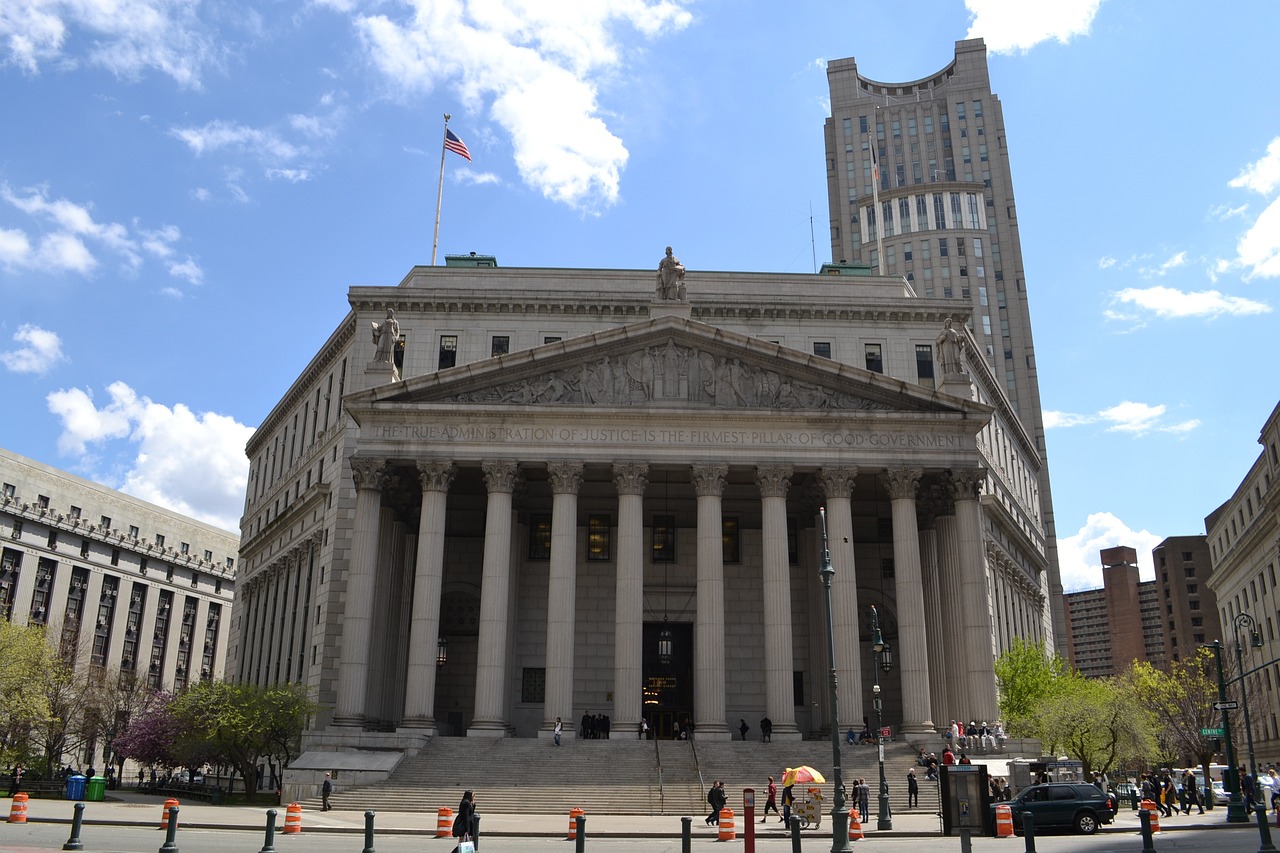
The legitimacy of authority is a cornerstone of political philosophy, influencing how societies function and how individuals perceive their rulers. At its core, legitimacy refers to the rightfulness of authority; it answers the critical question: why should people obey the law? This concept is not merely theoretical; it has profound implications for governance, social order, and individual rights.
When authority is perceived as legitimate, citizens are more likely to comply with laws and regulations. This compliance fosters a sense of stability and order within society. However, legitimacy is not automatically granted; it must be earned through various means, including:
- Consent of the Governed: The idea that authority derives its legitimacy from the consent of the people is a fundamental principle in democratic societies. When citizens participate in the electoral process, they endorse the authority of their leaders.
- Rule of Law: Legitimacy is bolstered when laws are applied equally and fairly. When individuals see that laws protect their rights and are enforced without bias, they are more likely to view the authority as legitimate.
- Historical Tradition: In some cases, authority gains legitimacy through historical continuity. Monarchies, for instance, often rely on tradition to justify their rule, claiming a divine right or ancestral lineage.
However, the quest for legitimacy is fraught with challenges. Political upheaval, social unrest, and corruption can severely undermine the perceived legitimacy of authority. For example, when governments fail to address the needs of their citizens or engage in abuses of power, trust erodes, leading to civil disobedience and protests. The Arab Spring is a prime example, where widespread discontent with authoritarian regimes challenged the legitimacy of long-standing rulers.
Moreover, the rise of social media has transformed how legitimacy is perceived and contested. Citizens can now voice their opinions and mobilize collective action more effectively than ever before. This shift has led to a more informed populace that demands accountability and transparency from those in power. In this digital age, the legitimacy of authority is continuously scrutinized and challenged, creating a dynamic interplay between rulers and the ruled.
In sum, the legitimacy of authority is essential for maintaining law and order within a society. It requires a delicate balance between power, consent, and accountability. Without legitimacy, authority risks becoming arbitrary and oppressive, leading to societal discord and instability. As political landscapes evolve, understanding the nuances of legitimacy will remain crucial for fostering a just and orderly society.
- What is the difference between legitimacy and authority? Legitimacy refers to the acceptance and recognition of authority by the governed, while authority is the power or right to enforce rules and make decisions.
- How can a government maintain its legitimacy? A government can maintain its legitimacy by ensuring fair laws, promoting transparency, engaging with citizens, and respecting human rights.
- What happens when authority is perceived as illegitimate? When authority is seen as illegitimate, it can lead to civil unrest, protests, and challenges to the established order, often resulting in significant political change.

In the intricate dance of governance, authority often finds itself in a precarious position, constantly challenged by various forces within society. These challenges can stem from a multitude of sources, each with its own implications for law and order. Understanding these challenges is crucial for grasping the dynamics of political systems and the stability of social order.
One of the primary challenges to authority comes from social movements. These movements often arise in response to perceived injustices or inequalities, pushing back against established norms and laws. For instance, movements advocating for civil rights, environmental justice, or economic reforms can significantly disrupt the status quo, demanding that authorities reconsider their policies and practices. The impact of these movements can be profound, leading to legal changes and shifts in public opinion.
Moreover, the advent of technology has introduced new challenges to authority. With the rise of social media, information spreads rapidly, allowing dissenting voices to gain traction almost overnight. This democratization of information can empower citizens to question authority, mobilize protests, and share alternative narratives that challenge the official line. In this digital age, maintaining authority requires not just enforcement of laws but also engagement with the public and a willingness to adapt to changing societal norms.
Another significant challenge arises from political dissent. In democratic societies, dissent is often viewed as a healthy part of the political process. However, when dissent turns into widespread disobedience or civil unrest, it poses a direct challenge to authority. Authorities must navigate this fine line, balancing the need for order with the rights of individuals to express their grievances. Failure to manage dissent effectively can lead to a breakdown of trust between the government and its citizens, further complicating the landscape of law and order.
Additionally, economic factors can undermine the legitimacy of authority. Economic disparities often breed discontent, leading to protests and calls for reform. When a significant portion of the population feels marginalized or ignored, their willingness to comply with laws diminishes. This scenario creates a fertile ground for challenges to authority, as individuals and groups seek to address their grievances through various means, including civil disobedience.
Lastly, the role of cultural shifts cannot be overlooked. As societies evolve, so do their values and expectations. Authorities that fail to recognize and adapt to these cultural changes may find themselves increasingly challenged. For example, movements advocating for LGBTQ+ rights have reshaped legal frameworks in many countries, challenging traditional notions of authority and governance. This ongoing evolution highlights the necessity for authorities to remain responsive and relevant to the changing tides of public sentiment.
In conclusion, the challenges to authority are multifaceted and deeply interconnected with the broader social, economic, and cultural landscapes. Authorities must remain vigilant and adaptable, recognizing that their legitimacy hinges not only on the enforcement of laws but also on their ability to engage with and respond to the needs of their constituents. The balance between maintaining order and respecting individual rights is a delicate one, and navigating these challenges is essential for fostering a just and stable society.
- What are some common challenges to authority? Common challenges include social movements, political dissent, economic disparities, and cultural shifts.
- How do social movements impact authority? Social movements can push authorities to reconsider laws and policies, often leading to significant legal changes.
- What role does technology play in challenging authority? Technology, especially social media, allows for rapid dissemination of information, empowering citizens to question and mobilize against authority.
- Why is dissent important in a democracy? Dissent is crucial as it encourages dialogue, promotes accountability, and ensures that diverse perspectives are considered in governance.

The relationship between law, order, and individual rights is a fascinating yet intricate web that shapes our society. At its core, law is designed to protect the rights of individuals while simultaneously maintaining order within the community. Imagine a balance scale: on one side, you have the need for societal order, and on the other, the rights of individuals. When one side tips too far, chaos or oppression can ensue, leading to a breakdown in trust between the governed and those in power.
In many democratic societies, laws are established with the intent of safeguarding individual freedoms. However, the enforcement of these laws often raises questions about the extent to which order can be maintained without infringing upon personal liberties. For instance, consider the implications of laws that allow for surveillance or restrictions on free speech. These laws may be justified in the name of public safety, yet they can also lead to a slippery slope where individual rights are compromised.
One of the most significant challenges in this relationship is finding a balance between protecting individual rights and ensuring societal order. This challenge is further complicated by the fact that different political systems interpret these concepts in varying ways. In some regimes, laws may prioritize order at the expense of personal freedoms, leading to authoritarianism. In contrast, other systems may lean too heavily towards individual rights, resulting in a lack of cohesion and stability.
To illustrate this complexity, consider the following table that outlines different political frameworks and their approach to law, order, and individual rights:
| Political Framework | Emphasis on Law | Emphasis on Order | Emphasis on Individual Rights |
|---|---|---|---|
| Democracy | High | Moderate | High |
| Authoritarianism | Low | High | Low |
| Libertarianism | Moderate | Low | Very High |
| Socialism | High | Moderate | Moderate |
This table highlights that the prioritization of law, order, and individual rights can vary significantly depending on the underlying political ideology. In a democracy, for example, there is generally a strong emphasis on protecting individual rights, which can lead to a more vibrant and engaged citizenry. However, this can also create tensions when laws are perceived as infringing upon those very rights.
Moreover, social movements play a pivotal role in this dynamic. They often arise when individuals feel that their rights are being overlooked or violated. These movements can challenge existing laws and push for reforms that better align with contemporary understandings of justice and individual rights. For instance, movements advocating for civil rights, gender equality, and environmental justice have reshaped legal landscapes, demonstrating the power of collective action.
In conclusion, the interplay between law, order, and individual rights is not just a theoretical debate; it is a lived reality that affects every individual in society. As we navigate this complex relationship, it is crucial to remain vigilant and engaged in conversations about how laws are created, enforced, and reformed. This ongoing dialogue is essential for ensuring that the scales of justice remain balanced, allowing for both order and the protection of individual freedoms.
- What is the primary purpose of law in society?
Law serves to protect individual rights while maintaining order and stability within the community. - How do social movements influence laws?
Social movements challenge existing laws and advocate for reforms that reflect evolving societal values and rights. - Can individual rights ever be compromised for the sake of order?
Yes, but this raises ethical concerns and can lead to authoritarian practices that undermine democracy. - What role does authority play in law enforcement?
Authority is essential for enforcing laws, but its legitimacy is crucial for public trust and compliance.

In the intricate dance of governance, the challenge of balancing individual rights with the necessity for societal order often takes center stage. Imagine a tightrope walker, carefully navigating the thin line between freedom and security. On one side, we have the essential rights that allow individuals to express themselves, pursue their dreams, and live without oppression. On the other, we find the need for order, which ensures that society functions smoothly and that the rights of one do not infringe upon the rights of another. This balancing act is pivotal in political philosophy, as it shapes the laws and policies that govern our lives.
At the heart of this discussion lies the question: How do we protect individual liberties while ensuring that society remains orderly and safe? The answer is not straightforward, as it requires a nuanced understanding of both legal frameworks and societal values. For instance, laws that protect freedom of speech are crucial for a democratic society, yet they must be carefully crafted to prevent hate speech and incitement to violence. This is where the concept of proportionality comes into play, suggesting that any limitations on rights must be necessary and reasonable, serving a legitimate aim without being excessively restrictive.
Furthermore, the role of public opinion cannot be underestimated. In a democratic context, the voices of the people can influence how rights and order are balanced. When societal norms shift, so too can the laws that govern them. For example, movements advocating for civil rights and social justice have historically prompted significant legal reforms, demonstrating that the balance between rights and order is not static but rather a dynamic interplay influenced by cultural and political contexts.
Yet, the challenge remains: how do we ensure that the pursuit of order does not lead to the erosion of individual freedoms? This is particularly relevant in times of crisis, such as during a public health emergency or national security threat, where governments may impose restrictions that, while aimed at maintaining order, risk infringing on rights. The key lies in transparency and accountability, ensuring that any measures taken are justified, temporary, and subject to review.
To further illustrate this complex relationship, consider the following table that outlines some key aspects of balancing rights and order:
| Aspect | Rights | Order |
|---|---|---|
| Definition | Fundamental freedoms guaranteed to individuals | Stability and structure within society |
| Examples | Freedom of speech, right to privacy | Law enforcement, public safety regulations |
| Challenges | Potential for abuse or infringement | Risk of authoritarianism |
| Philosophical Perspectives | Libertarianism, Human Rights Theory | Utilitarianism, Social Contract Theory |
Ultimately, the balance between rights and order is not merely a theoretical exercise; it is a practical necessity that requires ongoing dialogue and reflection. As society evolves, so too must our understanding of how to navigate this delicate balance. The goal is to create a framework where individuals can thrive while living harmoniously within a structured society, ensuring that neither rights nor order are compromised.
- What is the importance of balancing rights and order? Balancing rights and order is crucial to ensure that individual freedoms are protected while maintaining societal stability and safety.
- How can governments ensure this balance? Governments can ensure this balance through transparent laws, accountability, and public engagement in the legislative process.
- Are there historical examples of this balance being tested? Yes, historical events such as civil rights movements and national emergencies often test the balance between individual rights and societal order.

Social movements have historically played a pivotal role in shaping laws and societal norms, acting as a catalyst for change and a voice for the marginalized. These movements arise from a collective desire to address perceived injustices, challenge existing power structures, and advocate for the rights of individuals and communities. The impact of social movements on law and order is profound, often leading to significant legal reforms and shifts in public policy. For instance, movements advocating for civil rights, gender equality, and environmental protection have not only raised awareness but have also resulted in legislative changes that reflect the demands of the populace.
One of the most striking aspects of social movements is their ability to mobilize public opinion and galvanize support across diverse groups. When individuals come together to advocate for a common cause, they create a powerful force that can influence policymakers and shift societal attitudes. Take the civil rights movement in the United States, for example. Through peaceful protests, sit-ins, and marches, activists were able to draw national attention to the injustices faced by African Americans, ultimately leading to landmark legislation such as the Civil Rights Act of 1964 and the Voting Rights Act of 1965. These laws not only transformed the legal landscape but also reinforced the idea that law must evolve to reflect the moral values of society.
Moreover, the rise of digital technology and social media has revolutionized the way social movements operate. Today, grassroots organizations can reach a global audience in a matter of seconds, allowing them to gather support and mobilize action like never before. This digital age has given rise to movements such as #MeToo and Black Lives Matter, which have sparked conversations around issues of sexual harassment, systemic racism, and police brutality. The virality of these movements has forced lawmakers to confront uncomfortable truths and address systemic issues that have long been ignored.
However, the impact of social movements is not without its challenges. As they push for change, they often encounter resistance from established authorities and institutions that may feel threatened by the disruption of the status quo. This tension can lead to conflicts where the enforcement of law and order may clash with the rights of individuals to protest and advocate for change. For instance, during protests, law enforcement agencies may impose restrictions that can be viewed as infringing on the rights of assembly and free speech, raising ethical questions about the balance between maintaining order and respecting individual liberties.
In conclusion, the impact of social movements on law and order is a double-edged sword. While they serve as vital instruments for societal change, they also highlight the complexities of governance and the ongoing struggle to balance individual rights with the need for order. As we continue to witness the evolution of social movements, it becomes increasingly important to recognize their influence on legal frameworks and the broader implications for justice and equality in society.
- What are social movements?
Social movements are organized efforts by groups of people to bring about social change, often focusing on issues like civil rights, environmental protection, or political reform. - How do social movements impact laws?
Social movements can lead to changes in laws and policies by raising public awareness, mobilizing support, and pressuring lawmakers to address specific issues. - What role does technology play in social movements?
Technology, particularly social media, has enhanced the ability of social movements to communicate, organize, and mobilize support on a global scale. - Are social movements always peaceful?
While many social movements advocate for change through peaceful means, some may experience conflict or resistance from authorities, leading to confrontations.
Frequently Asked Questions
- What is the fundamental purpose of law in society?
The fundamental purpose of law is to establish a framework for social order and justice. It serves to regulate behavior, protect individual rights, and promote the common good. By setting clear rules and consequences, law helps to minimize conflicts and maintain peace within a community.
- How does order contribute to political stability?
Order is crucial for political stability as it creates an environment where governance can function effectively. Without order, societies can descend into chaos, leading to conflicts and a breakdown of trust in institutions. Order ensures that laws are followed, and it fosters an atmosphere where citizens feel safe and secure.
- What is the difference between natural law and positive law?
Natural law is based on inherent moral principles believed to be universal and unchanging, while positive law is constructed by human beings and varies from one society to another. Natural law advocates argue that certain rights are inherent to human nature, whereas proponents of positive law emphasize the importance of laws created through legislative processes to maintain order.
- How do justice and law enforcement intersect?
Justice and law enforcement are intertwined as law enforcement agencies are tasked with upholding laws that are meant to deliver justice. However, the effectiveness of law enforcement in achieving true justice can be a subject of debate, as it often involves ethical considerations and the potential for bias in enforcement practices.
- What role does community policing play in society?
Community policing plays a vital role in fostering collaboration between law enforcement and the community. By building trust and encouraging open communication, community policing enhances public safety and promotes a more just society. It shifts the focus from merely enforcing laws to actively engaging with citizens to address their concerns.
- What factors contribute to the legitimacy of authority?
The legitimacy of authority is often derived from its ability to act in the best interest of the public, maintain order, and uphold justice. Factors such as transparency, accountability, and public participation can enhance the perception of legitimacy. When people believe that authority is acting fairly, they are more likely to comply with laws and regulations.
- How do social movements impact laws and individual rights?
Social movements can significantly influence laws and the understanding of individual rights by challenging existing norms and advocating for change. They often bring attention to injustices and push for reforms that reflect the evolving values of society. This dynamic interplay can lead to the expansion of rights and adjustments in legal frameworks.
- What challenges exist in balancing individual rights with societal order?
Balancing individual rights with societal order presents a complex challenge, as protecting one can sometimes infringe upon the other. Philosophical debates often center around finding this equilibrium, with some arguing for prioritizing order to maintain peace, while others advocate for the protection of individual freedoms as a cornerstone of justice.



